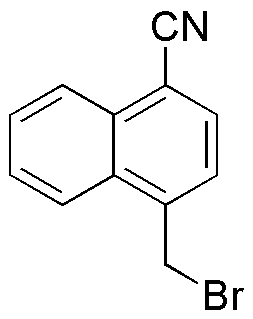4-(Bromomethyl)naphthalene-1-carbonitrile is widely utilized in research focused on:
- Synthesis of Specialty Chemicals: This compound serves as a versatile intermediate in the synthesis of various specialty chemicals, particularly in the production of naphthalene derivatives that are important in the manufacturing of dyes and pigments.
- Pharmaceutical Development: It is used in the development of pharmaceutical compounds, especially in creating new drugs with potential therapeutic effects, due to its unique chemical structure that can interact with biological targets.
- Material Science: The compound finds applications in material science, particularly in the development of polymers and resins that require specific chemical properties for enhanced performance in various applications.
- Research in Organic Chemistry: It is a valuable reagent in organic chemistry research, facilitating the study of reaction mechanisms and the development of new synthetic methodologies.
- Agrochemical Formulations: This chemical is also explored in the formulation of agrochemicals, contributing to the development of effective pesticides and herbicides that are essential for modern agriculture.
General Information
Properties
Safety and Regulations
Applications
4-(Bromomethyl)naphthalene-1-carbonitrile is widely utilized in research focused on:
- Synthesis of Specialty Chemicals: This compound serves as a versatile intermediate in the synthesis of various specialty chemicals, particularly in the production of naphthalene derivatives that are important in the manufacturing of dyes and pigments.
- Pharmaceutical Development: It is used in the development of pharmaceutical compounds, especially in creating new drugs with potential therapeutic effects, due to its unique chemical structure that can interact with biological targets.
- Material Science: The compound finds applications in material science, particularly in the development of polymers and resins that require specific chemical properties for enhanced performance in various applications.
- Research in Organic Chemistry: It is a valuable reagent in organic chemistry research, facilitating the study of reaction mechanisms and the development of new synthetic methodologies.
- Agrochemical Formulations: This chemical is also explored in the formulation of agrochemicals, contributing to the development of effective pesticides and herbicides that are essential for modern agriculture.
Documents
Safety Data Sheets (SDS)
The SDS provides comprehensive safety information on handling, storage, and disposal of the product.
Product Specification (PS)
The PS provides a comprehensive breakdown of the product’s properties, including chemical composition, physical state, purity, and storage requirements. It also details acceptable quality ranges and the product's intended applications.
Certificates of Analysis (COA)
Search for Certificates of Analysis (COA) by entering the products Lot Number. Lot and Batch Numbers can be found on a product’s label following the words ‘Lot’ or ‘Batch’.
Numéro de catalogue
Numéro de lot/série
Certificates Of Origin (COO)
This COO confirms the country where the product was manufactured, and also details the materials and components used in it and whether it is derived from natural, synthetic, or other specific sources. This certificate may be required for customs, trade, and regulatory compliance.
Numéro de catalogue
Numéro de lot/série
Safety Data Sheets (SDS)
The SDS provides comprehensive safety information on handling, storage, and disposal of the product.
DownloadProduct Specification (PS)
The PS provides a comprehensive breakdown of the product’s properties, including chemical composition, physical state, purity, and storage requirements. It also details acceptable quality ranges and the product's intended applications.
DownloadCertificates of Analysis (COA)
Search for Certificates of Analysis (COA) by entering the products Lot Number. Lot and Batch Numbers can be found on a product’s label following the words ‘Lot’ or ‘Batch’.
Numéro de catalogue
Numéro de lot/série
Certificates Of Origin (COO)
This COO confirms the country where the product was manufactured, and also details the materials and components used in it and whether it is derived from natural, synthetic, or other specific sources. This certificate may be required for customs, trade, and regulatory compliance.


